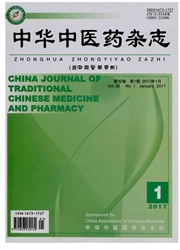

 中文摘要:
中文摘要:
目的:探究活血胶囊对气虚血瘀证大鼠脑组织兴奋性与抑制性氨基酸的影响。方法:邻苯二甲醛柱前衍生化法,高效液相色谱-荧光检测器(HPLC-FLD)分别检测对照组、模型组、活血胶囊各剂量组脑组织中2种兴奋性氨基酸和3种抑制性氨基酸的含量变化,荧光检测激发波长Ex为340nm,发射波长Em为455nm。结果:与对照组比较,模型组兴奋性氨基酸的含量均显著性升高(P〈0.01),抑制性氨基酸的含量均显著性降低(P〈0.01);与模型组比较,活血胶囊8g/kg组兴奋性氨基酸的含量显著性降低(P〈0.01),抑制性氨基酸的含量均显著性升高(P〈0.01)。结论:活血胶囊对气虚血瘀证的治疗作用与其调节氨基酸的含量密切相关。
 英文摘要:
英文摘要:
Objective: To explore the influence of Huoxue Capsule on excitatory and inhibitory amino acids in the cerebral tissues of rats with syndrome of blood stasis due to qi deficiency. Methods: The changes of two kinds of excitatory amino acids and three kinds of inhibitory amino acids in the brain tissues of rats in each group were determined by using precolumn derivatization with OPA method and HPLC-fluorescence detector with 340nm excitation wavelength and 455nm emission wavelength. Results: Compared with control group, the content of excitatory amino acids was increased significantly (P〈0.01) and inhibitory amino acids was decreased obviously (P〈0.01) in brain tissue of rats in model group. Compared with model group, the content of excitatory amino acids was decreased (P〈0.01) and inhibitory amino acids was increased (P〈0.01) in brain tissue of rats in Huoxue Capsule group (8g/kg). Conclusion: The therapeutic effect of Huoxue Capsule on syndrome of qi deficiency might relate closely with the regulation effect on amino acids contents.
 同期刊论文项目
同期刊论文项目
 同项目期刊论文
同项目期刊论文
 期刊信息
期刊信息
